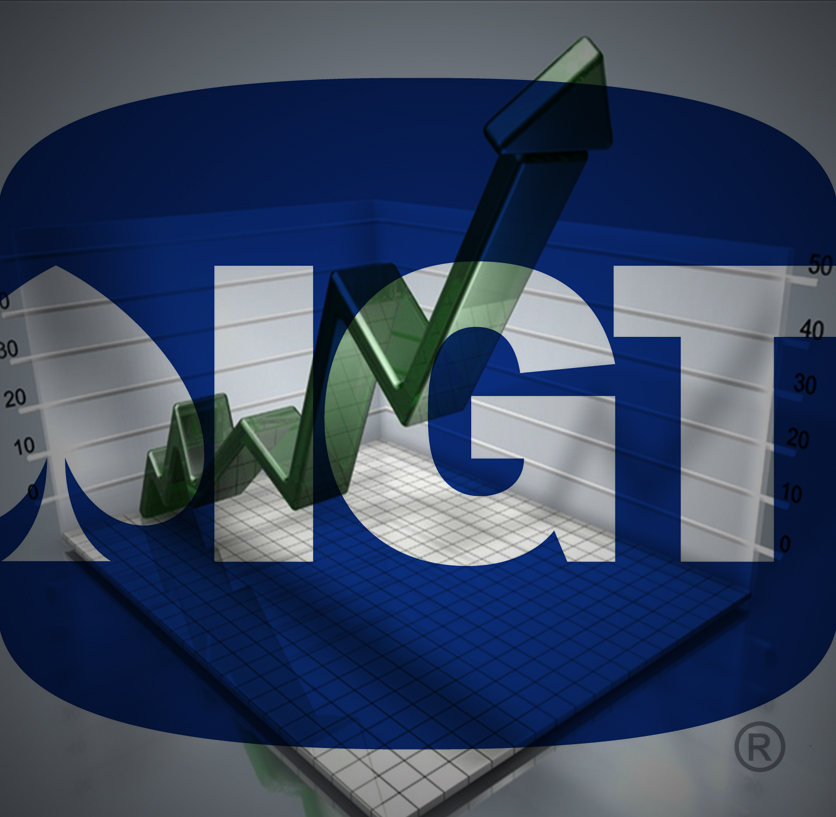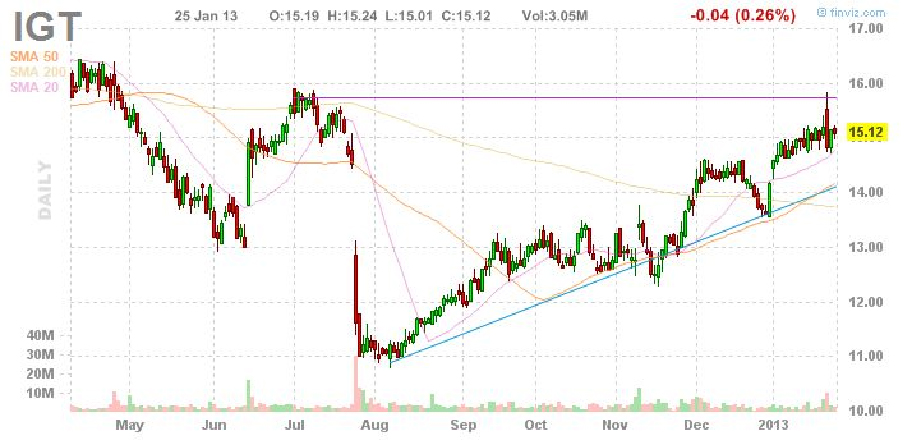 You have to give credit where credit is due. And while I’ve been hard on International Game Technology (IGT) over the past year – going so far as to call for CEO Patti Hart’s head last fall – the stock finally appears to be headed in the right direction. While the distraction of a looming proxy fight lingers on the horizon, Hart and other IGT executives can at least enjoy a second consecutive quarter of beating Wall Street estimates after posting solid first quarter results this week. Adjusted earnings per share of 28 cents and sales of $530 million beat estimates of 24 cents and $524 million, respectively, according to the AP.
You have to give credit where credit is due. And while I’ve been hard on International Game Technology (IGT) over the past year – going so far as to call for CEO Patti Hart’s head last fall – the stock finally appears to be headed in the right direction. While the distraction of a looming proxy fight lingers on the horizon, Hart and other IGT executives can at least enjoy a second consecutive quarter of beating Wall Street estimates after posting solid first quarter results this week. Adjusted earnings per share of 28 cents and sales of $530 million beat estimates of 24 cents and $524 million, respectively, according to the AP.
IGT shares jumped on the news, only to retreat and end only modestly positive; but the second straight earnings beat helped the stock continue its steady upward trend. Since hitting multi-year lows following a disastrous third quarter of 2012, and an oddly timed $400 million share buyback, IGT has performed nicely:

Indeed, the quarter seemed all-around positive for IGT. Revenue grew 19% year-over-year, as did pre-tax income. Earnings per share rose over 40%; adjusted earnings were 65 percent higher than those of the first quarter in 2012. The company re-affirmed its full-year guidance for fiscal 2013 (IGT’s fiscal year ends in September) of $1.20-$1.30 in adjusted earnings per share, well ahead of 2012’s $1.04.
Even Hart’s more controversial decisions appeared to be paying off. IGT announced that its accelerated buyback had been completed at a price of $13.22 per share. In my original piece criticizing Hart, I argued that the announcement of that buyback ahead of the aforementioned third quarter – whose results drove the stock down 20 percent – was poorly timed, forcing the company to buy shares at a higher price than would have been available after those earnings were released. Yet, IGT still appears to have made out OK; it wound up repurchasing those shares for exactly the share price at which IGT traded the day before the announcement, and at a 14% discount to Friday’s close of $15.12.
Meanwhile, the social gaming unit – created by IGT’s similarly oft-criticized acquisition of Double Down Interactive early last year – saw revenue increase 15% sequentially (from the directly previous quarter). Daily bookings per user drove much of that growth, reaching 31 cents per user per day from 28 cents in Q4 of 2012. As Hart herself noted on the post-earnings conference call, that figure dwarfs that of better-known competitor Zynga (ZNGA), whose bookings per user were just 4.7 cents per user in the third quarter. (To be fair to Zynga, its numbers are hurt by the fact that its casino games run as separate apps, increasing its reported user base relative to that of Double Down and thus lowering its reported booking per user. Meanwhile, according to company filings with the SEC, its casino games – most notably Zynga Poker – are far more profitable and likely have higher bookings than other Zynga products. That said, those factors alone likely do not account for a daily booking rate that is less than one-sixth that of Double Down.)
On the post-earnings conference call, IGT management sounded confident, with CEO Hart calling the quarter “a really great start” and chief financial officer John Vandemore adding that “we are very pleased with our financial results for the quarter.” But there are still reasons for concern – concerns that even Hart and Vandemore readily admitted to on the call. Revenues in the “Gaming Operations” segment actually declined year-over-year, as IGT’s existing games saw less play on lower yield. The 19% revenue gain year-over-year was driven equally by a gain in product sales in North America and the addition of Double Down early last year. While units shipped increased smartly, the average selling price of units dropped, due to a focus on lower-priced markets in Illinois and Canada. Hart noted concern about the overall replacement market, particularly in the US, where she said the market was “continuing to bump along…with a certain amount of uncertainty.” Hart noted the company was “cautiously optimistic” about overall replacement demand but more confident that IGT could increase its market share in that segment. IGT has been slowly gaining ground against competitors such as Bally Technologies (BYI), attempting to reverse a long decline that saw its market share fall by half between 2004 and 2011. With relatively few casino openings slated in the US over the next two years, and domestic revenue completely stagnant, IGT is going to have gain share to come anywhere close to maintaining the product sales growth seen this quarter on a consistent basis.
While the social gaming segment did show nice growth, it’s also clear that the Double Down acquisition continues to cost IGT cash. CFO Vandemore argued that IGT “still see[s] opportunities for growth on the revenue side that far outstrip the investments we need to make” in social gaming, justifying the expense, but this year it is clear that social gaming will be a drag on profits. IGT did for the first time guide for social gaming to be “GAAP accretive” in 2014, meaning that the company will boost total earnings per share that year, even accounting for the cost of earn-out payments for milestones the division hits and retention payments for its employees. But that guidance requires continued growth at Double Down; but its daily active user base grew by little more than three percent from the fourth quarter of 2012. That rate needs to rise for Double Down’s revenues to show the expected increase, because growth in bookings simply can’t last forever (indeed, bookings per user have declined of late at Zynga and all across the social gaming space.)
It’s also worth pointing out that, excluding revenue added in the Double Down acquisition, year-over-year revenue growth in the legacy slot machine business was still less than 10 percent, showing that both the demand for slot machines and IGT’s position in that market are still somewhat wobbly. Indeed, much of the headline numbers are not quite as impressive as they are at first glance. Repeating a talking point from the proxy fight with Ader Investment Management, Hart noted that 2013 was projected to be the “fourth straight year of double-digit growth in adjusted earnings from continued operations.” But that growth – as I noted two weeks ago – comes off the incredibly subdued market of 2009, following the worldwide financial crisis, and much of the projected growth in earnings per share in fiscal 2013 comes not from net income, but from the share buyback executed last year. That repurchase lowered IGT’s share count by 10 percent; thus, on a company-wide basis, adjusted net income is only projected to rise between four and eleven percent. And that figure excludes additional costs from the Double Down acquisition, notably the payments due the company’s previous shareholders if certain performance targets are met. Meanwhile, the recent gains in IGT’s share price – which has risen 33 percent in the last six months – look nice on a chart, but it’s not clear that the company’s performance has been the main driver. Gambling stocks as a whole, as measured by the Market Vectors Gaming ETF (BJK), are up 25 percent over the same period, buoyed by improving economic sentiment and a rising broad market.
So while the last two quarters have been solid for IGT, there is still plenty of reason for skepticism. As good as the six-month chart posted above looks, investors also need to consider the following:

That chart shows IGT stock over the last ten years: truly a lost decade for IGT shareholders, as earnings and market share have declined under two successive administrations. Two strong quarters do not, on their own, erase that history. IGT management deserves kudos for posting strong results in a difficult market, but there are challenges ahead, as replacement sales see pressure and yields from existing machines stagnate. Double Down has grown well; but the division remains a long way from justifying its half-billion dollar price tag. In its final statement to shareholders ahead of the proxy vote (scheduled for March 5th), IGT itself listed seven different companies – including two of its largest customers, Caesars Entertainment (CZR) and MGM Resorts International (MGM) – competing in the social gaming space. On the post-earnings conference call, analyst Felicia Hendrix asked about High 5 Games, an IGT partner (it developed the popular Da Vinci Diamonds game), whose own Facebook casino became the fastest-growing virtual casino ever earlier this month.
There are a host of challenges facing IGT’s business; and, of course, a battle awaiting its CEO at the shareholders meeting in March. Given their recent success, the company deserves credit; but given its history, and its tenuous position, it still deserves skepticism as well.
